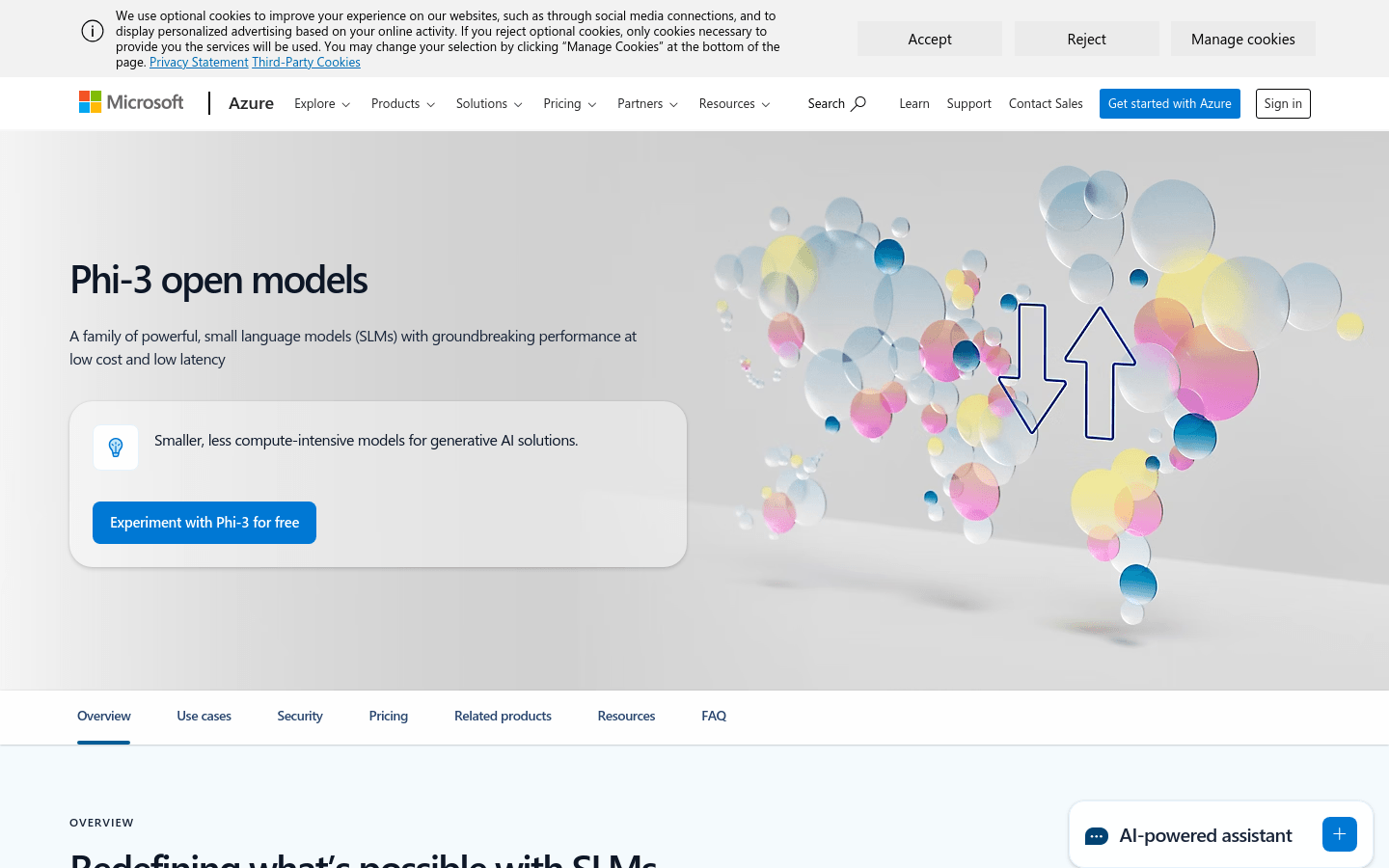

Phi 3
Overview :
Phi-3 is a series of small language models (SLMs) launched by Microsoft Azure, featuring groundbreaking performance while maintaining low costs and latency. These models are designed for generative AI solutions, being smaller in size and requiring lower computational resources. The Phi-3 model is developed in accordance with Microsoft's AI principles, including accountability, transparency, fairness, reliability, safety, privacy, and inclusiveness, to ensure security. Additionally, Phi-3 supports local deployment, provides accurate and relevant responses, low-latency scenario deployments, cost-constrained task handling, and customizable precision.
Target Users :
Phi-3 is ideal for developers and enterprises looking to balance cost and performance. Whether in real-time interactions that require quick responses, autonomous systems, applications with low latency demands, or tasks constrained by budget, Phi-3 provides effective solutions.
Use Cases
Developers use Phi-3 to create chatbots in local environments to protect user privacy.
Businesses deploy Phi-3 on edge computing devices for rapid data analysis and decision-making.
Educational institutions utilize the Phi-3 model for teaching and research in natural language processing.
Features
Local Deployment: Operates effectively in offline environments where data privacy is critical or connectivity is limited.
Accurate Relevant Responses: Generates more coherent, precise, and contextually relevant outputs.
Low Latency Scenarios: Deploys at the edge for faster response times.
Cost-Constrained Tasks: Utilizes Phi-3 for simple tasks to reduce resource demands and costs without sacrificing performance.
Custom Precision: Enhances performance by fine-tuning the model with domain-specific data.
Security: Built-in security and compliance, with Microsoft committing $200 billion to cybersecurity over five years.
Flexibility: Phi-3 can run in the cloud, on the edge, or on devices, allowing greater deployment and operational flexibility.
How to Use
1. Register for an Azure account and obtain free trial credits.
2. Navigate to the Azure AI model catalog and select the Phi-3 model.
3. Choose the deployment method according to your needs – this could be on the cloud, edge, or device.
4. If necessary, fine-tune the Phi-3 model using the Azure Machine Learning SDK.
5. Use the Phi-3 model to develop generative AI applications or customize assistants.
6. Test and deploy applications on Azure AI Studio, monitoring performance and results.
7. Adjust based on feedback to optimize application performance.
Featured AI Tools

Gemini
Gemini is the latest generation of AI system developed by Google DeepMind. It excels in multimodal reasoning, enabling seamless interaction between text, images, videos, audio, and code. Gemini surpasses previous models in language understanding, reasoning, mathematics, programming, and other fields, becoming one of the most powerful AI systems to date. It comes in three different scales to meet various needs from edge computing to cloud computing. Gemini can be widely applied in creative design, writing assistance, question answering, code generation, and more.
AI Model
11.4M
Chinese Picks

Liblibai
LiblibAI is a leading Chinese AI creative platform offering powerful AI creative tools to help creators bring their imagination to life. The platform provides a vast library of free AI creative models, allowing users to search and utilize these models for image, text, and audio creations. Users can also train their own AI models on the platform. Focused on the diverse needs of creators, LiblibAI is committed to creating inclusive conditions and serving the creative industry, ensuring that everyone can enjoy the joy of creation.
AI Model
6.9M













